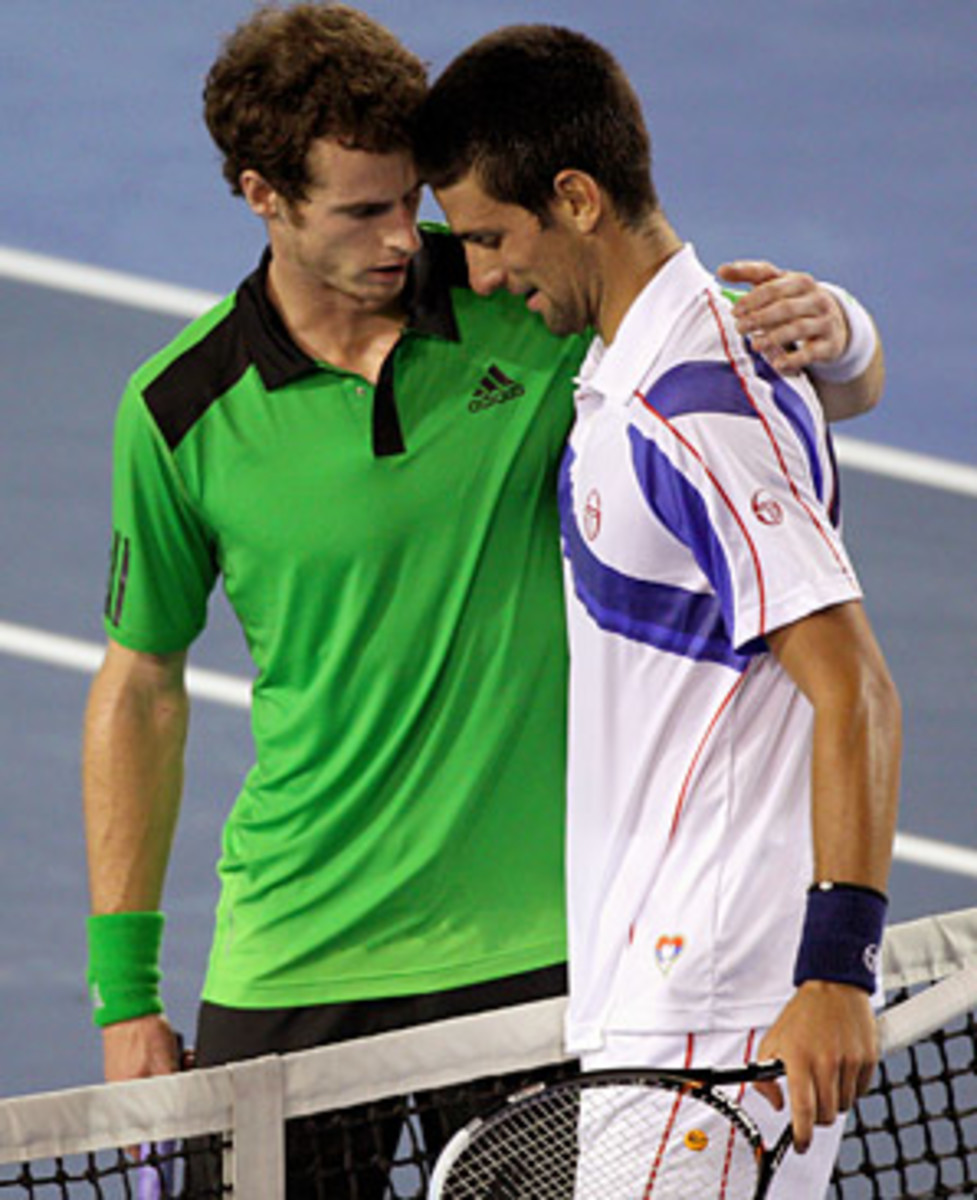Djokovic brilliant in Aussie win, while Murray curiously disappears
Actually, it's not at all curious. Murray had a reputation to erase, and instead he revealed it in big, bold letters. You could sense the exasperation in the comments of ESPN's Chris Fowler, Darren Cahill, Patrick McEnroe and Brad Gilbert during this 6-4, 6-2, 6-3 thrashing, all of them driven to depression by Murray's desultory performance.
It's likely that no one would have beaten Djokovic on this day. Certainly not Roger Federer, who was dismissed in straight sets in the semifinals, and perhaps not even a healthy Rafael Nadal. Djokovic has truly arrived as an athlete and a competitor, an absolute marvel of fitness and all-around play.
What's bothersome is that Murray had no chance to beat Djokovic, not from the start, and his body language made that abundantly clear. The laconic Scot is never going to remind anyone of the fist-pumping, crotch-grabbing Jimmy Connors out there, and everyone understands that. But mannerisms are a reflection of self-belief. If things aren't going well, then it's time to switch emotional gears. If there's an image more unsettling than Murray on court Sunday, it's that of his many fans in the United Kingdom, switching off their television sets in disgust.
"My God, Nigel," one says to another. "That was awful."
One can only imagine the media roasting back home. Some of the early dispatches have arrived, sparing any semblance of sympathy. In describing "two hours and 39 minutes of truly wretched tennis," the Guardian's Kevin Mitchell wrote, "He moved with the bounce of a sloth. He did not like the tension in his racket or in his soul. He was leaden, sullen, beaten. It's not history that weighs Andy Murray down. It's Andy Murray. There are too many of him."
One of the great thinking-man's players, Mats Wilander, has never quite understood Murray's on-court nature. "I guess the difference between someone like me and Andy is that nothing ever got me down," Wilander said last year. "I never shook my head, never showed the other guy that I was feeling. And I think that's something he's got to learn."
No kidding. As Murray launches his seventh Grand Slam campaign, you have to wonder if it will ever happen. He has played Djokovic enough times (since both were 13) to know the man's game, inside and out. In their last three hardcourt meetings, Murray was victorious each time. But he was entirely unprepared for Djokovic's career resurrection, so marvelously evident in the Davis Cup final and now signaling a new day at the top of men's tennis.
In winning his second major, a stronger and more mature performance than his 2008 Australian conquest of Jo-Wilfried Tsonga, Djokovic was a whirlwind of all-court brilliance. On the defense, he ran down one apparent winner after another, managing desperate returns as he slid his body back into position. His serve was penetrating and reliable. Given just the slightest opening, he pounded clean winners from both wings.
Most everyone was expecting a long, multitiered affair, but this match was defined early, in the final game of the first set, when the two engaged in a 39-shot rally. If for no other reason than to end the madness, Djokovic made a rare trip to the net -- and Murray netted his forehand pass. That set up the decisive break point, Murray sailing a routine forehand long, and with the first set in hand, Djokovic gained a competitive stranglehold he would not relinquish.
Where was the energy from Murray? Where was his inevitable shift in tactics, strategizing his way back into contention? Perhaps there was nothing he could do. That's how it looked from afar. It was unfortunate, though, to watch him in a state of apparent resignation.
Paul Annacone, the long-respected coach now working with Federer, has always been distrustful of Murray's game. "Because he's such a good counterpuncher, and an extreme perfectionist, he struggles to be offensive at times," Annacone said. "He feels like he can absorb anything, keep the ball in play until the other guy misses, or he gets a short ball. Against the best players it can be a problem, because they'll go for it."
Djokovic seized this opportunity in the manner of all great champions, showing only the occasional trace of vulnerability. This may have been one of the most unsatisfying finals in recent Grand Slam history, but it was a pleasure to watch a likable, often-doubted player reach the summit. While celebrations erupted in the sporting pockets of Serbia, a sense of gloom enveloped Great Britain, from Murray's native Dunblane to the shores of Cardiff.
And the list grows longer: Bunny Austin, Bobby Wilson, Roger Taylor, John Lloyd, Tim Henman and now Murray, all of them measured in futility against the ghost of Fred Perry, a man in white flannels, the last British man to capture a major (1936). Such feats were strictly habit for Perry, a thoroughly dashing presence on the court and in the company of high society. A fierce rival of the great Ellsworth Vines, among other greats of the time, Perry won three Wimbledon titles, one Australian, one French and three at what was then called the U.S. Championships, saving two match points to defeat Don Budge in '36.
In his comprehensive History of Tennis, Bud Collins describes Perry as "jaunty, a bit cocky in his breezy self-assurance, with gallery appeal. He could be sarcastic and some thought him egotistic, but it was a pose and he had an ever-ready grin. He cut a handsome figure with his regular features, raven black hair, and physique that was perfection for the game. Once he developed the stroke that had eluded him (a running forehand, attacking the ball on the rise), he was virtually unstoppable."
These are the standards against which Andy Murray is measured. Such a towering mountain to climb. Perry stands at the summit, trumpeting his magnificence. Murray, clad in Birkenstocks, lurks somewhere in the village.





